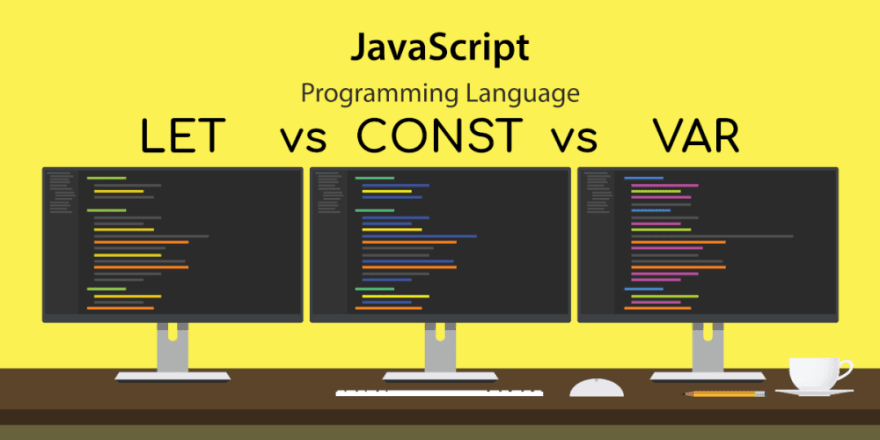Saturday, January 15, 2022

Although Var, Let, and Const all are ways of declaring variables in JavaScript. There are some differences between them in terms of scope, modification, and re-declaration of the variable.
var a = 1;
let b = 1;
const c = 1;
Note: Scope essentially means where these variables are available for use.
Comparison Table
| Var | Let | Const | |
|---|---|---|---|
| Scope Type | Global or Local Scoped | Block Scoped | Block Scoped |
| Update existing value | True | True | False |
| Re-declaration of variable | _True _ | False | False |
| Hoisting Behavior | initialized with undefined in global scope | initialized in block scope | initialized in block scope |
Users can:
Example 1
var a = 1; // First declaration
console.log(a);
a = 5; // Updating the variable
console.log(a);
var a = 2; // Re-declaring the variable
console.log(a);
Output:
1
2
3
Users can:
Example 1
Example 1
let a = 5;
console.log(a);
a = 2; // Updating the variable
console.log(a);
Output:
5
2
Users cannot:
Example 2
let b = 5;
let b = 3; // This is throw an error
Output:
Cannot redeclare block-scoped variable 'b'
Users cannot:
Example 1
const a = 5;
a = 10; // This will throw an error
Output:
Uncaught TypeError: invalid assignment to const 'a'
Example 2
const b = 5;
const b = 3; // This will throw an error
Output:
Cannot redeclare block-scoped variable 'b'
One additional point to remember about const is that:
Every const declaration must be initialized at the time of declaration.
Example 3
const c;
// This is an error because 'const' declarations must be initialized.
Output:
Uncaught SyntaxError: missing = in const declaration
Global Scoped variable is any variable that is declared with var outside of a function block. And it is available for use in the whole program.
var a = 10; // Globally scoped variable 'a'
function f1() {
console.log(a); // Accessing ‘a’ inside the function
}
f1();
console.log(a); // Accessing ‘a’ outside the function
Output:
10
10
Local Scoped variable is any variable that is declared with var within the function block. And it is available and can be accessed only within that function.
function f2() {
var b = 10; // Function or Locally scoped variable 'b'
console.log(b);
}
console.log(b); // Uncaught ReferenceError: b is not defined
Output:
10
Uncaught ReferenceError: b is not defined
A block is a chunk of code bounded by .
Block Scoped variable is any variable that is declared with let or const within the block. And it is only available for use within that block.
Var Examples Example 1
if (true) {
let a = 15;
}
console.log(a); // Uncaught ReferenceError: a is not defined
Output:
Uncaught ReferenceError: a is not defined
Example 2
let b = 33;
if (true) {
let b = 44; // Different b from outside of this block
console.log(b); // ‘b’ which is declared inside this block
}
console.log(b); // ‘b’ which is declared outside of if block
Output:
44
33
Example 3
Since we again declare 'c' inside the if block, the console.log(c) will throw Uncaught ReferenceError: can't access lexical declaration 'c' before initialization.
This is because of the block-scoped and hoisting nature of the let variables.
let c = 33;
if (true) {
console.log(c); // Will throw an error
let c = 44;
}
Output:
Uncaught ReferenceError: can't access lexical declaration 'c' before initialization
Example 4
let d = 33;
if (true) {
console.log(d);
d = 44; // This ‘d’ variable is same ‘d’ from outside of this block
console.log(d);
}
console.log(d);
Output:
33
44
44
Const Examples
Example 1
if (true) {
const a = 15;
}
console.log(a); // Uncaught ReferenceError: a is not defined
Output:
Uncaught ReferenceError: a is not defined
Example 2
const b = 33;
if (true) {
const b = 44; // Different b from outside of this block
console.log(b); // ‘b’ which is declared inside this block
}
console.log(b); // ‘b’ which is declared outside of if block
Ouput:
44
33
Example 3
Since we again declare 'c' inside the if block, the console.log(c) will throw Uncaught ReferenceError: can't access lexical declaration 'c' before initialization.
This is because of the block-scoped and hoisting nature of the const variables.
const c = 33;
if (true) {
console.log(c); // Will throw an error
const c = 44;
}
Output:
Uncaught ReferenceError: can't access lexical declaration 'c' before initialization
JavaScript Hoisting refers to the process whereby the interpreter appears to move the declaration of functions, variables or classes to the top of their scope, prior to execution of the code.
All declarations (function, var, let, const and class) are hoisted in JavaScript, while the var declarations are initialized with undefined, but let, and const declarations remain uninitialized.
Hoisting of Var variables
console.log(a); // outputs 'undefined'
var a = 3;
Output:
undefined
Hoisting of Let variables
console.log(b); // Will throw error
let b = 3;
Output:
Uncaught ReferenceError: can't access lexical declaration 'b' before initialization
Hoisting of Const variables
console.log(c); // Will throw error
const c = 3;
Output: Uncaught ReferenceError: can't access lexical declaration 'c' before initialization
Note: Please refer to the Hoisting in JavaScript Articles for more information.